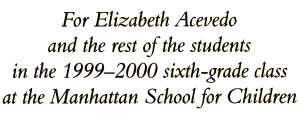
Find more great Horn Book content at these links:
Recommended books: reviews and themed booklists
App and e-book reviews
Movie reviews
Event news and recaps
Events calendar
Be "the hero and the author" of your story
If you have the opportunity to see Elizabeth Acevedo speak, go.
 Photo: Elissa Gershowitz.
Photo: Elissa Gershowitz.If you have the opportunity to see Elizabeth Acevedo speak, go.
I was lucky enough to attend two of her events as the inaugural Gwen Ifill Mentor-in-Residence at Simmons University last week, and I still can't get enough.* (And that's in addition to hearing her Fiction & Poetry Award acceptance speech at the 2018 BGHB ceremony in October and her video interview the following day!)
On Tuesday afternoon, Elizabeth visited the undergraduate sociology seminar "Leaders for Social Justice," taught by professor Becky Thompson. She spoke about the different strands that came together to form The Poet X: her own life as a first-generation Dominican American growing up in New York City; the dynamics of family and religion; her immersion in hip-hop and slam poetry at a young age; her experiences of inhabiting a female body in our society; even a writing exercise about hagiophobia (the fear of saints and relics).
 Photo: Cindy Ritter.
Photo: Cindy Ritter.Elizabeth began writing what would become The Poet X alongside teaching middle-school literature classes and, later, pursuing her MFA in creative writing; it was a secret. That secrecy afforded Elizabeth a lot of leeway to experiment and play; she "didn't know what it was just yet," but that was okay. She had some anxiety as to whether she was "a real writer" — "real" enough to write a novel — but her experience in writing and performing poetry had given her the valuable skills of translating emotion to language, "listening well," and "editing by ear," as well as the opportunity to workshop poetry and incorporate her audience's responses into her revision process. Even more importantly, Elizabeth felt that this story — in many ways, her own story — was one that deserved, and needed, to be told.
Elizabeth doesn't consider The Poet X to have an unqualified happy ending: Xiomara and her family are "on the road to understanding," but that road may be long and challenging. They are "gonna be okay," though — she said, "I refuse to write stories about young people of color without a semblance of hope, or that uses them as punching bags on the way to hope." She writes tenderly, "from love."
 Photo: Elissa Gershowitz.
Photo: Elissa Gershowitz.Elizabeth's deep tenderness for her characters and her readers was evident in her public-wide event the next day, a mix of conversational presentation and powerful performance (check out "A Rat Ode," her clapback-in-poetry to a dismissive professor in her MFA program). In addition to many members of the Simmons University community, a group of students of color from a local high school were in attendance. During the Q&A they felt compelled to share just how much The Poet X meant to them. One young woman, embraced and encouraged by her friends, broke down in tears while speaking about how Xiomara's experience helped her to appreciate her own body. The author responded to every question and comment with immense empathy and love. (“Your body is not a problem. You crying right now is not a problem.”) The student certainly wasn't the only one crying!
She also shared a full-circle story: as a sixth grader, Elizabeth wrote to author Angela Johnson wanting to read more about Bobby, a teen father who's a secondary character in Johnson’s novel Heaven. Elizabeth didn't receive a reply in the mail — but when The First Part Last, telling Bobby's story, came out a few years later, it was dedicated to "Elizabeth Acevedo and the rest of the students in the 1999–2000 sixth-grade class at the Manhattan School for Children." The Poet X is, in turn, dedicated to Elizabeth's former students, particularly Katherine, whose questions "Where are the books about us?" and (after she had read all the Jacqueline Woodson, Sandra Cisneros, and Julia Alvarez that Elizabeth could give her) "What's next?" helped inspire the novel.


I have many more pages of insights and quotes that moved me and made me think — but I urge you to go see Elizabeth yourself and fill your own notebook with her warmth and wisdom.
*I highly recommend listening to The Poet X audiobook, which Elizabeth narrates herself, and watching her many performances on YouTube (here's a good place to start).

RECOMMENDED
ALREADY A SUBSCRIBER? LOG IN
We are currently offering this content for free. Sign up now to activate your personal profile, where you can save articles for future viewing.







Add Comment :-
Be the first reader to comment.
Comment Policy:
Comment should not be empty !!!